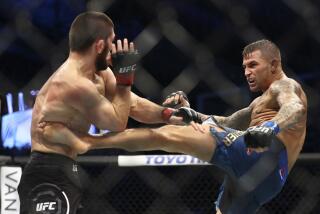Floyd Mayweather Jr., Manny Pacquiao agree to Olympic-type drug tests
- Share via
The U.S. Anti-Doping Agency has been retained to supervise rigorous drug testing for the Floyd Mayweather Jr.-Manny Pacquiao fight, leaving each boxer exposed to serious repercussions if either is found to be using performance-enhancing drugs.
USADA Chief Executive Travis Tygart told The Times the agreement will give his agency full access to conduct unannounced in- and out-of-competition blood and/or urine tests of the fighters at any point through fight night, May 2, at the MGM Grand in Las Vegas.
“It’s a strong statement of the importance of clean and safe competition to have these two fighters voluntarily agree to have a WADA-level anti-doping program implemented for this fight. We commend them for their stand for clean sport and the message it sends to all those who want to compete clean at the highest levels of all sport,” Tygart said.
Tygart said both fighters agreed to stipulations of the World Anti-Doping Agency code, which calls for a four-year ban from competition for any athlete who tests positive for PEDs.
That would be a devastating fall for either the unbeaten, 38-year-old Mayweather or the record eight-division champion Pacquiao, 36.
USADA oversees drug testing programs for Olympic sports, including track and field, cycling and swimming, and also has been retained to preside over triathlons and some mixed-martial-arts and boxing matches.
USADA also is a founding partner with the U.S. Olympic Committee, Major League Baseball and the NFL in the Partnership for Clean Competition, which supports and funds advancements in drug-testing research. WADA, in turn, establishes international testing standards.
The Mayweather-Pacquiao fight is expected to shatter boxing pay-per-view and live-gate records, and Mayweather said at a news conference Wednesday in Los Angeles that he expects to earn “nine figures for 36 minutes of work.”
Mayweather first insisted on USADA testing for his fight against Shane Mosley in May 2010, after Pacquiao declined to participate in blood testing, a stance that led to the scrapping of the first attempted negotiation for a Mayweather-Pacquiao fight.
Mayweather later claimed in a video that Pacquiao used performance-enhancing substances, referring to “power pellets,” which led Pacquiao to sue Mayweather and ultimately collect a settlement believed to be in the $5-million range.
Pacquiao’s promoter, Bob Arum, said the rigid drug testing announced Friday “stops the rumors and bad speculation. This testing is cosmetic in the sense that it shuts up anyone making false accusations.
“We’ve agreed on the USADA testing, and we’ve agreed to their rules. I believe a lot of this that was spread around [about Pacquiao’s reluctance to test] was unfortunate and nonsensical. There’s not any issue with Manny or Floyd. They aren’t taking performance-enhancing drugs.”
In 2012 Pacquiao suffered a sixth-round knockout loss to Juan Manuel Marquez, who had not been able to knock down Pacquiao in three previous bouts. For the 2012 bout the fighters were subjected to minimal drug testing, with urine tests performed by the Nevada State Athletic Commission only immediately before and after the fight.
Following that loss, Pacquiao agreed to random blood and urine tests by the Las Vegas-based Voluntary Anti-Doping Assn. for his bouts in Macao against Brandon Rios in 2013 and Chris Algieri last November, according to VADA’s Margaret Goodman.
In this fight negotiation with Mayweather, Pacquiao quickly accepted Olympic-style drug testing.
USADA said it will inform both the Nevada commission and WADA of test results from Mayweather and Pacquiao. The agency plans to use the advanced Carbon Isotope Ratio process in testing for synthetic testosterone while also testing for the energy-boosting EPO and strength-building human growth hormone.
More to Read
Go beyond the scoreboard
Get the latest on L.A.'s teams in the daily Sports Report newsletter.
You may occasionally receive promotional content from the Los Angeles Times.











